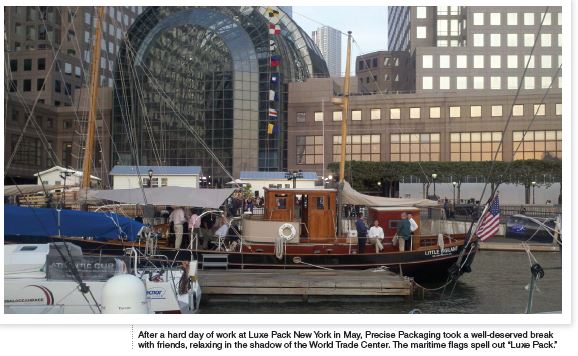Written on: July 1, 2012 by Ava Caridad
Aerosol manufacturer Empack Spraytech Inc. was given this year’s Award for Advanced Manufacturing for its innovative work in the automotive and chemical sectors at the 16th Annual Brampton Outstanding Business Achievement Awards held in April.

Custom fragrance development company Tru Fragrance announced the launch of Tru Blooms Chicago, a community initiative debuting in Chicago, IL. With a mission of sustainability, urban beautification and job creation through the planting of gardens specifically for the development of a fragrance, the initiative hopes to transform the city’s public green spaces into growing spaces for flowers whose notes will be captured in a limited edition women’s perfume. Tru Blooms Chicago is a joint effort between Tru Fragrance, Chicago Park District, the Chicago Botanic Garden, Growing Power, Growing Home and NeighborSpace. Pictured: The groundbreaking of a half-acre garden in Grant Park. Roses, lavender and violets (the Illinois state flower) were planted in flowers beds here and throughout the city. Farmers employed through local nonprofits will cultivate the flowers throughout the growing season.
One-of-a-kind Tru Blooms Chicago First Harvest Limited Edition EDP will be available in limited quantities in three sizes (15ml, 50ml and 100ml). The fragrances will be offered at select Chicago-area retail locations and online at www.trubloomschicago.com beginning in October.
SC Johnson received a Wisconsin Business Friend of the Environment Award from the
Wisconsin Manufacturers & Commerce (WMC). SCJ was recognized in the Pollution Prevention category, in particular for its newest aerosol production line at its Waxdale manufacturing facility in Mount Pleasant, WI. The line uses compressed gas technology to manufacture Glade and Pledge aerosol products. In addition, the Waxdale facility has reduced volatile organic compounds (VOCs) by approximately six million pounds in its first year of operation. This is the equivalent of the greenhouse gas (GHG) emissions from 1,600 passenger vehicles per year or the CO2 emissions from 915,000 gallons of gasoline consumed.
